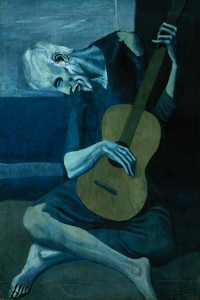Narcissism
Picasso & Woody: Like the Art & Not the Artist?
Can We Like the Art & Not the Artist?
Posted August 18, 2013
You like the art, but you don't like the artist. Does it matter?

You like the art, but you don't like the artist. Does it matter?
Picasso was a difficult man. Ezra Pound was politically scary. The list goes on.
Blue Jasmine:
After receiving some strong feedback (pro and con) on my review of Blue Jasmine, Woody Allen's new film, I thought I'd ask you all about the connection between art and psychology. In other words, should we care about a film, if we don't care about the life or times of a particular artist?
Blue Jasmine is a film that centers around the deterioration of a narcissistic character, named Jasmine. The story is about an empty person, who without wealth or social connections, discovers desperation.
The plot is straightforward; Jasimine is married to a Madoff like character, who loses everthing. Jasmine, then bereft of money and status moves in with her blue collar sister, Ginger and tries to undermine her love interest with a man named Chili.
Of course, Chili really cares for Ginger, but what does that matter since, to high brow Jasmine, he's obviously low class?
Jasmine is poison; but mostly for herself.
The core of the story can be seen in the meeting between Jasmine and her estranged step son. In this heart wrenching scene, Jasmine wants him back. It is a scene that is filled with anguish...her anguish.
And, that is the problem.
Jasmine, had betrayed her family and her son, had lied about it, turned herself into a victim, and then tells him that he must be there for her, because she needs him.
Narcissists may have "reasons" for their misdeeds, but healthy regret and remorse are often tough to find. Reminds me of too many people I've seen in the world of divorce. Regret (as opposed to pathological guilt) is a wholesome and difficult emotion. We don't discuss it enough as psychotherapists. Jasmine just regrets that she made mistakes that hurt her. (Think A Rod, Wall Street Shenanigans etc.)
There are those of you who found the movie without any redeeming message. I differ here because I found the characters of Chili and Ginger endearing - if not a bit overacted. It is my nature to see some light in darkness (maybe that's why I took on divorce as a topic), so I do see them as a redeeming subplot in the story.
Then there is the difficult problem of how we interpret the work of an artist, writer or thinker. Here the question becomes whether or not we should pay attention to Mr. Allen's work, given his personal story and what some may consider questionable ethics. This breaks down in my mind to three issues:
- We, as therapists, may be able to reconstruct the psychological underpinnings of the artist through his or her work. We can do it as a way to better understand the work or the artist. In this case, Blue Jasmine, may strike close to home (as in Mr. Allen's psychological home). If we are interested - and many of us are not - the movie may help us better understand how this particular artist thinks and feels.
- Should we reject work done by problematic people? Picasso was a terrible person who manipulated and used people with abandon. Jean Jacques Rousseau was a malignant personality, who left most of his progeny to die in orphanages. Carl Jung, had early sympathy ( I believe I am right here, but willing to be corrected) for Nazi ideas because of their love of the archetypical Aryan. Are we to toss out their contributions because we don't like them?
- Plus, the artist is an important subject of our studies. We are all interested in creativity and creators. It's something of that makes life more interesting. And, most artists write about what they know, their wounds, foibles etc. Shouldn't we devote time to ideas that may move us? The artist may be far from a saint, but he or she prods us, and that is a subject worth talking about.
I welcome more reviews and discussions like this one. The life of psychology is about DSM 5, insurance, neurobiology and such; but art needs to be part of our work as well.
Is there a movie, play or work of art that inspired you today?


